1. NICU Caregivers:
NICU parents can find solace in knowing that a dedicated team of doctors, nurse practitioners, and nurses are there to provide exceptional care to their baby. These compassionate professionals vigilantly watch over NICU babies and are there to support parents throughout their journey, alleviating fear and uncertainty.

2. Advocacy for Your Baby:
As a NICU parent, being your baby’s advocate is crucial. Communicate openly with the NICU staff, asking questions until you fully understand your baby’s care plan. This clarity will help ease fear and anxiety. Collaborate with the medical team, including doctors and nurses, to ensure the best possible care for your infant(s).

3. Understanding NICU Admittance:
Infants may be admitted to the NICU due to various reasons, such as low APGAR scores, jaundice, respiratory distress, or irregular heartbeats. Preterm deliveries may also lead to NICU stays. Understanding the factors that determine NICU admittance can help you mentally prepare for the situation.

4. Emotional Preparation:
Emotionally preparing yourself is crucial. Seeing your baby in the NICU can be overwhelming, but discussing your baby’s condition with your partner or loved ones and viewing photos before visiting can help ease the initial shock. Take care of your own postpartum recovery while trusting that your baby is receiving the best possible care.

5. NICU Visits:
Visiting your baby in the NICU may involve wearing protective gear, but it offers opportunities to bond and connect with your infant(s). While you might not immediately hold your baby, you can still touch them gently. If breastfeeding is not possible, consult with your baby’s nurse about pumping and providing breast milk for your baby.

6. Support and Mental Health:
NICU families may find it challenging to share their experiences with others. Choose what feels best for you and consider seeking support from mental health specialists or joining NICU parent support groups.

While becoming a NICU parent is unexpected and emotionally challenging, staying calm, informed, and connected with your baby and partner can make this journey more manageable. Remember that this difficult road is one you can navigate with the right support. Always consult your healthcare providers and adhere to safety guidelines during your NICU visits.
**Please note that current NICU safety guidelines may vary by hospital, so be sure to inquire about specific requirements during your visit.*











